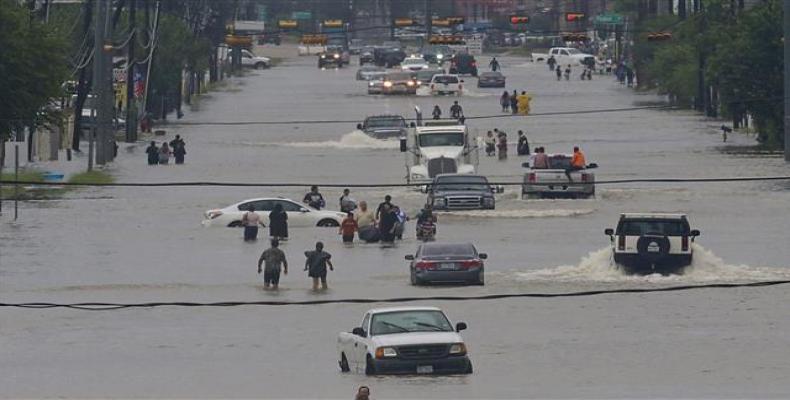Caracas, August 29 (RHC)-- The Venezuelan government has expressed its solidarity with the people and the government of the United States, as they deal with the death and destruction caused by Hurricane Harvey, the strongest storm to hit the state of Texas since 1961. "The Bolivarian Republic of Venezuela expresses its solidarity with the people and government of the United States of America after the passage of Hurricane Harvey, which caused severe rains and floods, thus leaving the unfortunate loss of human lives as well as innumerable material damage, particularly in Texas," an official statement issued in Caracas said.
Venezuela's solidarity comes just two days after Washington slapped new financial sanctions on the South American country. Stressing the historic ties between the United States and Venezuela, the government of President Nicolas Maduro said the framework of peace and solidarity is at the core of its Bolivarian principles. The statement hoped for an "early recovery of the affected areas and the relief of hardships of the citizens who have suffered this natural catastrophe."
Harvey, the most powerful storm to hit Texas in more than 50 years, has killed at least six people, as it reached inland Friday, knocking out power to more than 200,000 people and threatening catastrophic flooding.
The Governor of Texas has warned of more heavy flooding in the wake of the hurricane, which was downgraded to a tropical storm after making landfall. The National Weather Service warned in a tweet that the effects of Harvey are “unprecedented” and “unknown and beyond anything experienced." Authorities have urged residents to stay off the streets of Houston and other southeast Texas cities as rain falling at up to 5 inches per hour flooded roads and major intersections.
U.S. Customs and Border Protection, CBP, has also closed several checkpoints in the path of Hurricane Harvey to "remain vigilant against any effort by criminals to exploit disruptions caused by the storm" and also stated that checkpoints outside the path of Hurricane Harvey will remain operational. On its website, the Border patrol said that promoting "life-saving and life-sustaining activities, the safe evacuation of people who are leaving the impacted area," are its "highest priorities."
However, according to reports, the federal authorities left over 50 immigrant women and children stranded at a San Antonio bus station on Friday despite knowing some of the services were terminated as Hurricane Harvey approached. The asylum seekers, mostly from Central America, were due to travel to cities and towns across the U.S. after passing what the CBP calls credible fear interviews. However, their plans were interrupted when Greyhound Bus was forced to cancel many of its services.
"We were told yesterday that no buses are running tomorrow, so Congressman Lloyd Doggett [D-San Antonio] called ICE to not drop families at the bus station," Sister Denise LeRock, a member of the Interfaith Welcome Coalition, told Rivard Report. Doggett told the San Antonio news that Immigration and Customs Enforcement officials advised him Friday morning the group would be dropped off at the downtown station in time to make connections before the storm hit, but they arrived too late.
A representative from ICE did not immediately respond to a request for comment from the Washington Examiner. In a joint statement issued by ICE and CBP, the agencies said: "routine non-criminal immigration enforcement operations will not be conducted at evacuation sites or assistance centers such as shelters or food banks." San Antonio's Office of the City Manager, Department of Human Services, the Interfaith Welcome Coalition, among others, made arrangements for the refugees to be sheltered in a nearby church, according to NOWCastSA.
The storm ripped off roofs, snapped trees, triggered tornadoes and flash floods and cut off power to nearly 230,000 people, mostly in the Houston area. Houston police officials said officers were evacuating two flooded apartment complexes. Authorities have urged residents to stay off the streets of Houston and other southeast Texas cities as rain falling at up to 5 inches per hour flooded roads and major intersections. In the last 24 hours, parts of Harris County, including Houston, have seen more than 20 inches of rain.
The streets of Corpus Christi, a city of about 320,000 people, have been deserted since Saturday, with billboards twisted and strong winds still blowing. "It was terrible,” resident Joel Valdez, told Reuters. The storm ripped part of the roof from his trailer home at around 4 a.m., he said as he sat in a Jeep with windows smashed by the storm. “I could feel the whole house move.”
Texas Governor Greg Abbott said he was activating 1,800 members of the military to help with the statewide cleanup, while 1,000 people would conduct search-and-rescue operations. And oil and gas production was largely halted in the state, prompting price hikes at the pumps.
More than 45 percent of the country's refining capacity is along the U.S. Gulf Coast, and nearly a fifth of the nation's crude is produced offshore in the Gulf of Mexico. Just under 25 percent of Gulf output or 429,000 barrels per day had been shut down by the storm, the U.S. Bureau of Safety and Environmental Enforcement said Saturday.
Harvey was a Category 4 hurricane on the Saffir-Simpson scale when it hit the coast, the second-highest category, and the most powerful storm in over a decade to come ashore anywhere in the mainland United States. It weakened to tropical storm from hurricane strength Saturday, the U.S. National Hurricane Center said. Disruptions to fuel supply drove benchmark gasoline futures to their highest price in four months.
Venezuela Expresses Solidarity with U.S. in Catastrophic Flooding After Hurricane Harvey

Related Articles
Commentaries
MAKE A COMMENT
All fields requiredMore Views
- Adidas president highlights reunion with Cuba
- Cuba and Mongolia exchange on biotechnology in agriculture
- Founder of sport parachuting in Cuba passes away
- UNICEF says over 14,000 children killed in Israel’s genocidal war of aggression against Gaza
- Vegueros de Pinar remains at the top of the National Baseball Series

